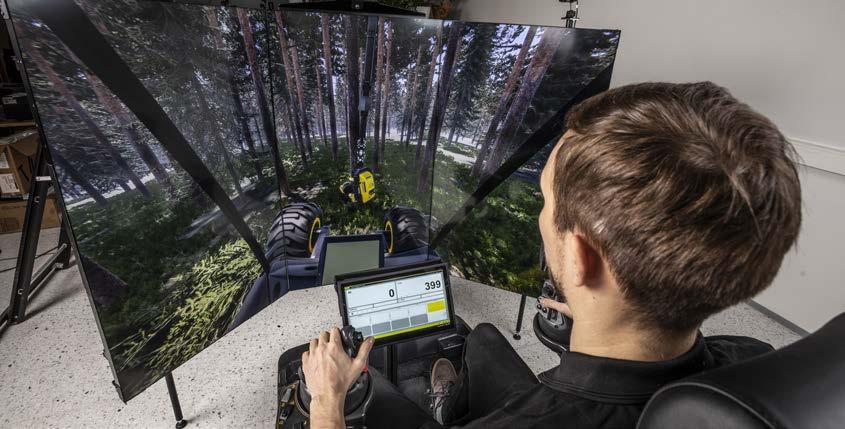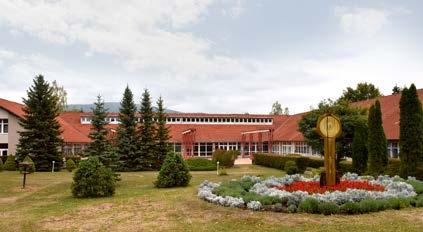
4 minute read
SIMULATORS TO SUPPORT TRAINING
by Ponsse Plc
A simulator is a cost-effective and safe environment for training new operators, forest machine professionals and service mechanics. In Finland, simulators have been used to support training for more than two decades. Recently, PONSSE simulators have been adopted by several education institutions in Hungary.
Ponsse is responding to the need for the development of forest industry training by modernising its simulator product range. As its name suggests, the new PONSSE Full Simulator is a full-range simulator system. Its realistic forest environment and detailed graphics create a perfect platform for professional training.
“The Full Simulator forms a training environment around the user that is as close to a real forest machine environment as possible. State-of-the-art digital technology makes simulator training easy and enjoyable,” promises Jussi Jurvanen, Ponsse’s simulator expert.
In addition to the new PONSSE Full Simulator, the product range consists of the PONSSE Basic and PONSSE Compact simulators. All three offer a modern learning environment for harvester, forwarder and PONSSE Opti information system training (except Basic, which does not have the Opti system).
“The genuine PONSSE Opti information system for harvesters and forwarders, combined with excellent ergonomics for the operator, makes simulator training not only motivating, but also fun,” Jurvanen says.
The simulator’s harvester section allows actual harvesting tasks to be practised, different thematic exercises to be performed as well as getting familiar with the operation of a machine’s control and measuring system.
In the forwarder section, it is possible to practise how to operate and load a forwarder and control a crane in realistic conditions. The PONSSE Full and PONSSE Compact simulators are also ideal for training maintenance employees.
“Sim Trainer, the simulator’s training management system, has levels for advancement as new skills are acquired. Right from the start, the safe, efficient and productive operation of forest machines is taught,” Jurvanen says.
SAFE AND COST-EFFECTIVE TRAINING In Finland, simulators have an established status as a core part of forest industry training. They can be used to train new students in the basics of safe and cost-effective machine operation and best working techniques.
As their skills increase, more elements can be introduced to the training, such as the effect of the machine’s adjustments on working efficiency and work ergonomics. These also help operators cope better at work.
“The new features of our simulators, such as calibration and adjustment of measuring devices, make learning faster and easier. When a process can first be practised in a simulator, the skills can be put in practice more quickly, and it’s easier to understand how results should be assessed, and what adjustments may need to be made, for example,” says Pekka Parta, a teacher in the South Savo Vocational College in Mikkeli.
In Hungary, good use of PONSSE simulators has been made in forest industry vocational training.
Simulators have a lot to give to seasoned professionals as well.
“The machines, technology and features are constantly developing, so even a skilled operator should reflect on and update their competence. Ponsse’s PRO1 training package guides professional operators in planning their work to be safe, cost-effective, ergonomic and productive,” says Jurvanen.
SIMULATOR TRAINING BECOMING POPULAR IN HUNGARY Hungary has enthusiastically adopted PONSSE simulators for use in vocational training. An established Hungarian forest industry education institution received three PONSSE Full Simulators thanks to the non-profit Herman Ottó Institute. The harvester and forwarder simulators are the first simulators in Hungary intended for the use of future forest machine operators. Previously, only the Faculty of Forestry of the University of Sopron had similar equipment.
“The number of forest machines is continuously increasing, so well-trained operators are increasingly needed as well. Institutions providing forest industry training have noticed this need, and this made it possible to acquire simulators for three different units,” says András Balint, Forest Power Kft, Hungary. Forest Power Kft is Ponsse´s official dealer in Hungary.
The Herman Ottó Institute’s simulator acquisition was significant, because as the technology in the forest sector advances, the mechanisation and automation of processes become increasingly important too. Students in vocational training are now provided with the skills they need in the use of modern technology. The education institutions also use the simulators they received for vocational adult education.
The North ASZC Mátra Forestry Technical School teaches students from all over Hungary to succeed in their chosen profession. The institute’s students include forest technicians, forest and harvesting industry professionals, and people interested in the Mátra region, forests, and game propagation. The institute has nearly 500 postgraduate students, who study part-time or in the evening.
The Ferenc Kiss Forestry Technical School has been producing forest technicians since 1955. Most of the institute’s students apply to the Faculty of Forestry of the University of Sopron after graduation, but the Gödöllő University of Agricultural Sciences and the Faculty of Horticulture in Kecskemet are also popular choices. Many alumni also work for large stateowned forest sector companies like KEFAG, DÁLERD, Gemenc and NYÍRERDŐ.
The Roth Gyula Agricultural Technical School is part of the Kisalföld Agricultural Vocational Training Center. The school trains foresters, forest technicians and environmentalists. The five-year studies are divided into two study paths: the forestry path and the silviculture and environment path. Of the school’s 450 students, 12 percent are women, most of whom are participating in further training in environmental protection. The training programme for forest technicians is currently being developed to ensure the students find work in their field. It is important to know how harvesters, forwarders and drones are operated, so having those skills is a significant benefit for the students on the job market.












